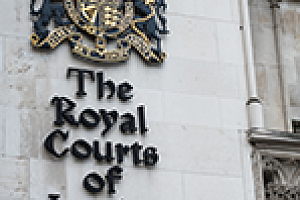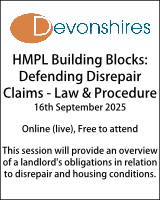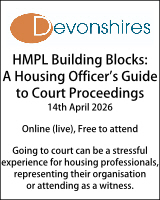Newsletter registration

Don’t refuse to mediate! Engage
Smile for the Camera?
ADHD diagnosis and disability
The coroner's duty to notify the DPP
Racist comments from one employee to another

Court of Protection case update: July 2025
Maximising ROI in renewable energy: Legal, technical, and financial strategies for net-zero success
Personal circumstances, public safety, and the planning balance
The Environment (Principles, Governance and Biodiversity Targets (Wales) Bill: the key provisions
Errors of law, materiality and remedies

What next for rent reviews?
Commonhold reform – the beginning of the end?
The CAT’s approach to Subsidy Decision Reviews: Fast, cheap and simple?
Millbrook Healthcare Limited v Devon County Council – Its impact on local government procurement
Early insights into the English Devolution and Community Empowerment Bill
The section 58 defence in the Highways Act 1980
Risk assessments in care proceedings: L-G and Re T
Turbulence ahead
PFI – a new era?
Costs in discrimination claims brought by litigants in person
The Building Safety Act and retrospective service charge protection
Right to Buy (RTB) leases — be warned about service charges
Awaab’s Law – implementation of Phase 1
Seven key insights: Lord Justice Birss considers AI in civil justice
Imperative requirements in homelessness: nuts and bolts on a bumpy roadmap to suitable accommodation
Neurodiversity in the Family Justice System Panel Discussion
Employment Law Webinar Series - May to July - 42 Bedford Row
Home Truths - Dissecting Section 16J: Criminal Confusion in the Renters’ Rights Bill - 42 Bedford Row
Home Truths: Grounds for Possession under the Renters' Rights Bill - 42 Bedford Row
Airport Subsidy Challenged in the CAT
IPA guidance 2025: Managing PFI distress and preparing for expiry
What might the public inquiry on child sexual exploitation look like
Data (Use and Access) Act – Updating Data Protection Law and more
High Court Dismisses Challenge to New Super Prison
AI, copyright and LLMs
Automatic suspensions and the public interest
FOI and communication
Too much?
Deploying ‘ADR’ in Planning & Compensation contexts
Removal from the village green register
The attendance of experts in family proceedings
Local authority enforcement powers and domestic beekeeping
Too little? When intervention is not required
Closures of educational sites
Public law case update Q1 2025
Must read
Families refusing access to support
Must read
Families refusing access to support
Local authority defeats High Court council tax challenge by claimant who said she had not consented to be taxed
The High Court has rejected a challenge to a council tax bill argued on the basis that since the claimant had not consented to be taxed the council could not collect it.
- Details
This rested on an 18th century judgment, but Mr Justice Fordham said the law clearly meant consent granted by elected representatives, not individuals.
He said in his judgment that the claimant had argued Oldham Metropolitan Bolton Council’s bill was unlawful as she had not consented to be taxed.
The claimant argued it had never been established that the Local Government Finance Act 1992 authorised the council to recover council tax from her in respect of her property because legislation does not and cannot bind an individual absent their individual consent.
This was based on the 1703 case of Ashby v White where Chief Justice Holt said: "By the common law of England, every commoner hath a right not to be subjected to laws made without their consent …"
The claimant said the preamble to the 1992 Act referred to "consent of the Lords Spiritual and Temporal, and Commons, in this present Parliament assembled, and by the authority of the same”.
There has been no individual consent – and no contract – and so there can be no liability, she argued. There had also been no impact assessment, and so the statutory scheme was incompatible with fundamental common law principles; and contrary to the rule of law.
Fordham J found “the specific constitutional principle identified by [the claimant]…plainly does not have the effect for which she contends.
“That is no surprise. If it did, no rating or taxing statute would apply to authorise levying monies from an individual who had not consented to it. Rating and taxing statutes ensure legal prescription, securing rather than undermining the rule of law, entirely compatibly with the Bill of Rights and other constitutional statutes.”
He noted the full quotation from the 1703 case went on to say “…because such consent cannot be given by every individual man in person, by reason of number and confusion, therefore that power is lodged in their representatives, elected and chosen by them for that purpose, who are either knights, citizens, or burgesses”.
Fordham J explained: “The point being made was about consent as expressed through the ballot box, with elected representatives in Parliament then deciding collectively about the merits of primary legislation.”
He went on: “This focus is precisely because of the impossibility and inappropriateness of individualised consent to legislation, from ‘every individual … in person’.”
The claimant’s point came “nowhere near satisfying” the threshold of arguability, Fordham J said.
He also dismissed points about the claimant’s wish to challenge liability orders for council tax of £2,568.79 and her arguments about needing a ‘court-issued’ liability order, or alternatively about needing proof from an entry in the court record, noting she had not attended one hearing that could have delay with the matter.
“She told me that this choice was taken because of the 'block listing' of the case with its 10 minute time estimate,” Fordham J said.
“I am unimpressed by that explanation. She chose to stay away. She could have invited Judge Clarke to direct a longer hearing for her legal points. The council had filed a skeleton argument, which she had received, filed in her own individual case. The council was addressing her case individually. So could she. She could have attended her hearing. She could have pointed to the liability order precondition.”
She had had a right of appeal within 21 days from Judge Clarke to a circuit judge but argued “that 21 days was too tight, as a litigant in person”. Fordham J was again “unimpressed by that explanation”
He further noted that under the relevant regulations a court could at any time discharge or vary a charging order on application of the debtor, the authority concerned or any person interested in the dwelling.
“In [the claimant’s] otherwise meticulously researched legal arguments, this entitlement appears to have been entirely overlooked”, he said.
Fordham J refused permission for judicial review and ordered the claimant to pay costs of £3,250 to Oldham, though said the council should not recover costs on an indemnity basis.
Mark Smulian
22-10-2025 4:00 pm
05-11-2025 4:00 pm

















































